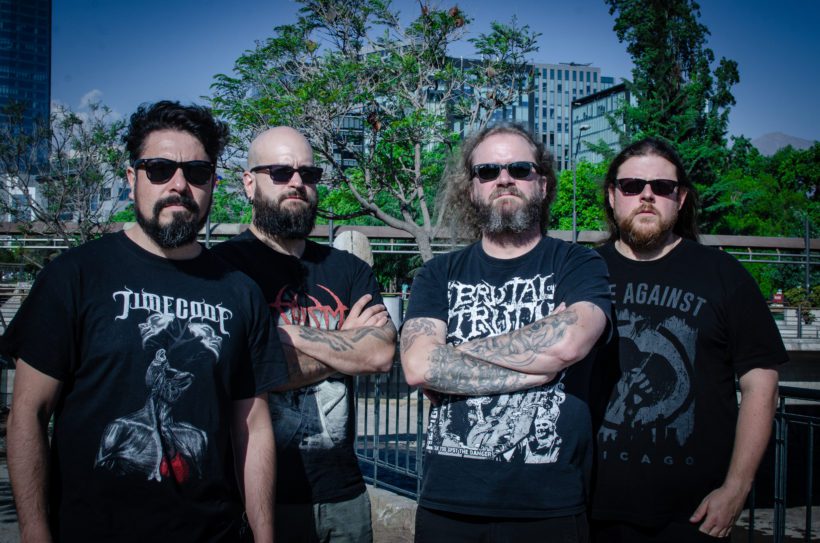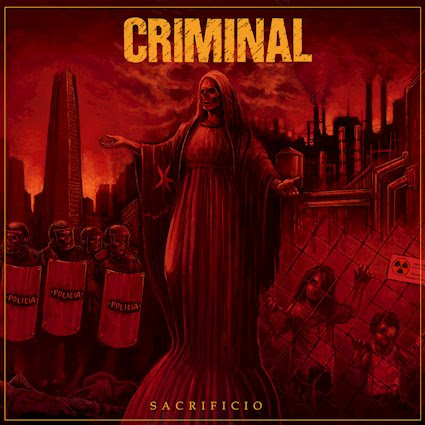
Chile thrash veterans Criminal return from a five-year absence with the utterly punishing, near-death metal effort, Sacrificio (Metal Blade). Born today yet inspired by Criminal’s South American past — the band currently resides in/out of country — Sacrificio adds Latin flair and unbridled groove (back into the mix). There’s nods to the early ‘90s without Criminal rehashing their past. From the Napalm Death (think Utopia Banished)-meets-Sepultura (think Chaos A.D.) throat-punch of “Live on Your Knees” and “Caged” to the thought-provoking, album-breathing dystopian churn of “The Whale” and “Ego Killer,” Criminal’s newest album finds the group as confrontational (and engaging) as ever.
Chile itself went through violent upheaval (and subsequent repression) in 2019, fueling main riff-purveyor and lyric writer Anton Reisenegger’s acerbic lyrics. Sacrificio isn’t just the follow-up to predecessor Fear Itself (2016) but rather a rallying cry to forces under foot and thumb in Chile (and the world over). Decades ago, Sepultura provided a similar show of support on Roots. This bullhorn of the oppressed can be heard/read on Spanish-language tracks like “Zona De Sacrificio” (check out the video below), “Sistema Criminal,” and the absolute death-thrash punishment that is “Theocrazy.”
Decibel sat down with Reisenegger to understand the Criminal’s newfound vigor, as it ages into its 30th year. “Neo-medieval vision / At war with truth and reason / Binary morality / Nihilistic prophecy”… Criminal speak truth to very old power on Sacrificio.
A few years divide previous album Fear Itself from new album Sacrificio. What were the members of Criminal up to in the intervening years?
Anton Reisenegger: The last few years I’ve been pretty busy with Brujeria. Since I joined the band, we’ve been touring pretty much non-stop, and in any downtime I had I would go and do stuff with my other bands Pentagram (Chile), Lock Up and Criminal. Danny landed a job as FOH/TM for Cradle of Filth with whom he toured the world for like two years. Danilo and Sergio also have other projects apart from their teaching jobs.
Sacrificio has a lot of continuous punch. There’s some indication this goes back to earlier Criminal albums, but I feel it’s really just a continuation of what the band has been doing since Victimized (1994). What’s your take?
Anton Reisenegger: It is and it isn’t. I think the new album connects really well with our earlier albums because it has this Latin feel that perhaps went missing a little since the band relocated to Europe. At the same time, it’s probably the most brutal album we’ve done so far, and that could be a continuation of what we’ve been doing on recent albums.
Anton Reisenegger: I guess partly I just like the simplicity and in-your-face aggression of early ’90s music. Nowadays, everyone seems to try to make a point of how complex and difficult they can make music, but I really just want that feeling of aggression and violence. When people talk about old-school they usually refer to the ’80s, but I think the ’90s were an equally exciting period with all of the Earache bands, Sepultura taking off and so on. And Criminal was born during that time.
What was the songwriting process like this time around? From what I know, the lineup is spread across several countries, time zones, quarantine protocols (due to the pandemic), etc. but it sounds like there were jam sessions.
Anton Reisenegger: The album was basically written by our drummer Danilo and myself, and yes, we went back to basics, sweating it out in a rehearsal room, just bouncing riffs, rhythms and ideas off of each other. I think that’s what gives this album its spontaneous, live feel. It’s so different from just writing riffs in front of a computer. And, by the way, this all happened before the pandemic hit. We had actually recorded all drums and rhythm guitars when the lockdowns started.
There are a few songs that feel more measured. “The Whale” and “Ego Killer” come to mind. How do these songs fit in with the more aggressive songs on Sacrificio?
Anton Reisenegger: Well, I think that, with all extremity, an album needs to breathe, it needs dynamics, ups and downs, and the two songs you mention, plus some other passages like the mid-section of “Theocrazy,” achieve exactly that, to allow the listener to catch their breath and get ready for the next battery.
The lead playing on Sacrificio has improved a lot too. I think Sergio’s really coming into his own as a voice and player. Did you give him freedom to compose the solos or were they discussed compositionally beforehand?
Anton Reisenegger: Sergio composed the solos on his own, but then worked on them (remotely) with our producer Seba Puente. At my age, I don’t have the patience to argue with a guitar player [Laughs], so I think Seba did a fantastic job, because, despite their melodic and technical nature, the solos have an aggressive feeling to them that really makes them fit the songs.
Anton Reisenegger: I knew from the beginning I wanted the album to start with “Live on your Knees,” because it’s the first song we wrote for the album and it’s kind of a statement of intent. “Caged” seemed like the obvious choice for track number two, and we just took it from there. The running order came together pretty quickly. Seba helped a lot with that too, and I think from the first draft we only changed one or two songs around.
How have events over the last few years in Chile affected your outlook or feelings toward your home country? How much of that sentiment is driven into your lyrics on Sacrificio? “Live on Your Knees,” “Theocrazy,” “Sistema criminal,” and “Age of Distrust” appear particularly pointed at the governmental/societal climate in Chile.
Anton Reisenegger:Well, I don’t know how much your readers know about this, but our country Chile has gone through some very violent protests and subsequent repression. There are many problems that are deeply rooted in our society, like political corruption, social elitism, etc., and things just came to a boiling point in 2019, coinciding with the writing process for this album, so as Chileans it seemed impossible to ignore these events in our lyrics. I would say four or five songs on the album deal with this subject from different angles, without it being a concept album.
How did producer/musician Sebastián “Seba” Puente (Nuclear) come into the picture? I know Dan [Biggin] was handling production for the last several albums.
Anton Reisenegger: Yes, I think Danny did a great job on the previous few albums, but it’s never the same to produce a band that you’re part of as having an outside producer who gives you a fresh perspective of your own songs. Seba Puente is a good friend of ours; he actually plays in a killer thrash band called Nuclear, and we went to his studio just to demo some songs at first. We started talking a lot and we seemed to agree on a lot of subjects regarding production vs. overproduction, natural sounds vs. samples and so on, so we decided to take him on as producer, and I have to say I don’t regret it for a second, because the album sounds exactly the way we wanted it to.
You also produced/engineered Sacrificio across several studios. That’s much easier recently than it used to be even 10 years ago. Was gluing all the parts together more or less challenging that the traditional studio experience?
Anton Reisenegger: Nah, that’s pretty easy nowadays. We recorded the drums in a different studio because it had a bigger room and very nice microphones, but then we went to Seba’s Audiocustom Studio and did everything else there, apart from the solos which Sergio recorded in his home studio in Berlin, Germany.

Anton Reisenegger: Well, actually we had our cover artist design the cover first and then we compared different choices of color, but it seemed like red was the most visually striking, and yes, of course it ties in with the idea of the blood that was spilled, not only during these protests, but over the course of our history.
What are the band’s plans for the rest of the year and into 2022?
Anton Reisenegger: Right now we’re gearing up to play a string of shows in Chile to celebrate the release of Sacrificio. There were a few things planned that have either been postponed or cancelled, so right now I really don’t want to say too much, but we definitely want to tour for this album. This line-up is killer and these songs were made to be played live!
** Criminal’s rampaging new album, Sacrificio, is out now on Metal Blade Records. Visit Criminal’s Bandcamp (HERE) for killer t-shirts (and spoofs on Priest and Slayer). Visit Metal Blade’s US store for vinyl (HERE) and CD (HERE). Thrash ’til death!






